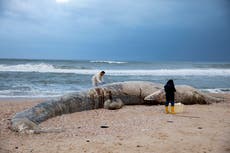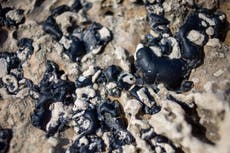Israel issues ‘unusual’ gag order on investigation into disastrous oil slick
‘Extraordinary’ move comes amid warnings cleanup could take decades

An investigation into a disastrous oil slick affecting Israel’s entire 120-mile coastline, as well as other areas in the eastern Mediterranean, is the subject of an “extraordinary” seven-day gag order, preventing media from publishing details from the investigation, according to reports.
Around 1,000 tonnes of tar from the oil spill is believed to have washed up, covering wildlife including baby turtles and fish which have been found covered in thick black oil, which conservationists have warned could take “decades” to cleanup.
But on Monday, in what Israeli news outlets including the Times of Israel and Haaretz have described as “extraordinary” and an “unusual move”, the country’s environment ministry said a judge had issued a gag order on publishing any detail related to the investigation, including anything which could identify any suspects, the vessel involved, their destination, cargo or port of departure.
According to Haaretz, the ministry said that “publications at this sensitive stage could harm a complex investigation with international aspects”.
The ministry is leading the investigation into the cause of the oil spill, which is believed to have taken place between 6 - 10 of February, and first came to light late last week, when a 17-metre (55ft) fin whale washed up dead on a beach in southern Israel.
Speaking on Sunday before the gag order was issued, environmental protection minister Gila Gamliel said the cleanup effort would likely cost tens of millions of shekels (millions of pounds).
She said: “We need to raise tens of millions of shekels that will be invested in cleaning the beaches. We have the possibility of suing the insurance company of the ship that is responsible for the pollution and we will do everything to locate it.
“Our moral obligation to the public is to locate those responsible for the event. Our goal is to open the bathing season on time. We need to look toward the future: This event and others like it in the world show us how urgent it is to wean ourselves from polluting fuels and move toward renewable energy.”
Neighbouring Lebanon has also reported oily beaches.
The ministry said it received no prior warning from any international organisations about the spill.
The true scale of the disaster remains unknown as greater quantities of tar could still be at sea and may yet be washed onto beaches.
According to The Times of Israel, European organisations assisting Israel with inquiries could pinpoint a suspect “possibly soon” and those responsible could be held to account.
Meanwhile, nine local authorities in Israel have had to pause essential clean up work after the Finance Ministry refused to approve a programme and budget submitted by the Environmental Protection Ministry.
On Monday evening, a cabinet meeting to discuss emergency funding for the cleanup “saw political mudslinging”, the paper said, and the continued refusal of the Finance Ministry to approve the Environmental Protection Ministry’s request.
The meeting reportedly ended without a decision and further negotiations were expected to take place later on Tuesday.
On Sunday, the environment ministry urged Israelis to stay away from the beaches, citing serious health hazards posed by the tar.
Israel’s Nature and Parks Authority has described it as one of the country’s "worst ecological disasters" to date, according to AP.
Join our commenting forum
Join thought-provoking conversations, follow other Independent readers and see their replies
Comments



Bookmark popover
Removed from bookmarks